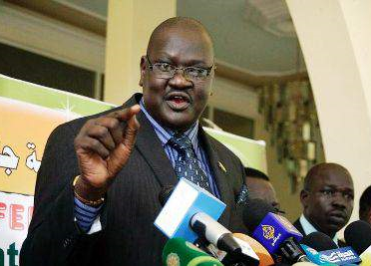South Sudan presidency describes rebels’ resolution as “war rhetoric”
May 4, 2015 (JUBA) – South Sudanese presidency has described as “war rhetoric” resolutions passed by the rebel faction led by former vice president, Riek Machar, in which they declared president Salva Kiir an illegitimate head of state when his term expires this month.

The rebel group condemned as unconstitutional the recent action by president Kiir’s government in which the national legislature extended for three more years its own lifespan and that of the president.
President Kiir’s elected term in office shall end on 21 May, in less than three weeks, while the constitutional mandate after independence shall end on 8 July, with the rebel group saying the elected head of state will become illegitimate thereafter. Parliament’s elected tenure also already expired on 8 March 2015.
But president Kiir’s press secretary in reaction to the resolutions said the opposition group had no power to question the legitimacy of the president in the country.
“The office of the president has learned with dismay the recent Pagak rebels’ resolutions calling the government illegitimate,” Ateny told reporters during the weekend.
“While our priorities are geared toward negotiating peaceful settlement and return the country to normalcy, the recent Pagak resolutions were mere war rhetoric and therefore fall-short of what was expected from the rebel side in search for peaceful solution of the political crisis in South Sudan,” he added.
Ateny further said that president Kiir “cherishes and upholds the fact [that] the power is vested in the people of South Sudan” but argued that conditions for going to polls this year are not favourable.
The extension of the tenure of the government, he said, came as a necessity to lead the process of reconciling the people and return the country to normalcy, therefore avoiding a power vacuum.
He further challenged that the rebels’ second conference in Pagak did not provide way forward to end the war.
“Instead, they take rhetoric of war,” he said, adding this was something the government did not expect, stressing that the government alone could not bring peace without the opposition group.
Both the president’s term and tenure of the national legislature were extended until July 2018 through amendment of transitional constitution, a move rejected by a number of opposition political parties and western countries such as the United States.
(ST)
